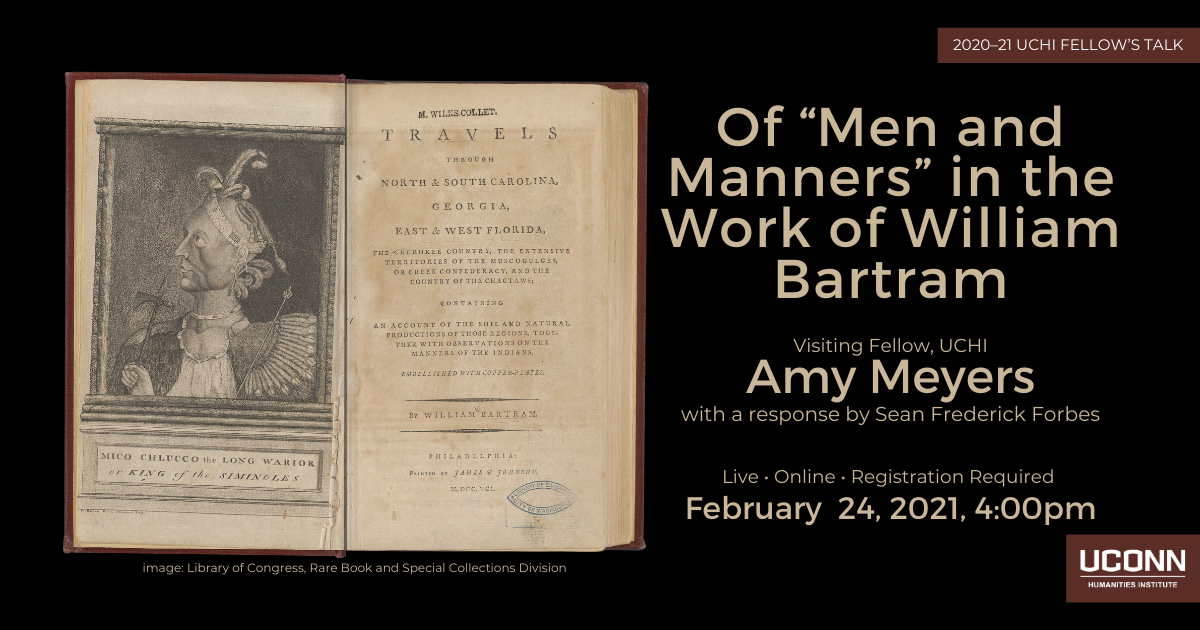Of “Men and Manners” in the Work of William Bartram
Amy Meyers (Visiting Fellow, UCHI)
with a response by Sean Frederick Forbes
Wednesday, February 24, 2021, 4:00pm (Online—Register here)
The verbal and visual portrayals of the flora and fauna of the North American continent by William Bartram (1739-1823) have long been interpreted as some of the first studies of environmental interchange executed by a naturalist of European descent. Yet Bartram’s writings on the Indigenous Americans of the Southeast, with whom he spent extended periods of time on two expeditions in the 1760s and 1770s, and the few drawings that he produced relating to American Indian life, have not been analyzed in the same terms. Excellent studies of Bartram’s unusual empathy for—and admiration of—the peoples he was encountering, (particularly the Creek, Seminole, and Cherokee) have been written in recent years, but little attention has been paid to the ways in which he utilized the models of environmental interplay that he established in his analysis of animals and plants to comprehend the complex and rapidly shifting relationships among the human societies that became the object of his examination. In this talk, Amy Meyers will discuss Bartram’s understanding of the long history of human migration, competition, and alliance that he observed as defining human interaction, and which he understood as applicable to all peoples, including those of European origin. Meyers also will examine Bartram’s deep concern for the preservation of American Indian cultures, and his anxiety over a national policy of assimilation which he felt compelled to support in the face of impending genocide. In the course of her discussion, Meyers will contrast Bartram’s attitudes toward Indigenous Americans with his views of, and behavior towards, enslaved peoples of African descent, whom he regarded with far less sympathy and understanding.
Amy Meyers (Yale PhD, American Studies, 1985) retired from the directorship of the Yale Center for British Art in June of 2019. Prior to her appointment in July of 2002, she spent much of her career at research institutes, including Dumbarton Oaks; the Center for Advanced Study in Visual Arts at the National Gallery of Art, Washington, D.C.; and The Huntington Library, Art Museum, and Botanical Gardens, where she served as Curator of American Art from 1988 through June of 2002. Meyers has written extensively on the visual and material culture of natural history in the transatlantic world, serving as editor of Knowing Nature: Art and Science in Philadelphia, 1740 to 1840 (Yale University Press, 2011, with the assistance of Lisa Ford). She also has edited, with Harold Cook and Pamela Smith, Ways of Making and Knowing: The Material Culture of Empirical Knowledge (University of Michigan Press, 2011); with Therese O’Malley, The Art of Natural History: Illustrated Treatises and Botanical Paintings, 1400-1850 (National Gallery of Art, Studies in The History of Art Series, 2008); Art and Science in America: Issues of Representation (The Huntington, 1998); and, with Margaret Pritchard, Empire’s Nature: Mark Catesby’s New World Vision (University of North Carolina Press, 1998). With Therese O’Malley, Meyers currently is organizing an exhibition with the working title of William Bartram and the Origins of American Environmental Thought. The project will bring together for the first time a wide selection of Bartram’s extraordinary drawings to examine his integrated view of nature and the emergence of environmental thought in North America, from the colonial period through the first decades of the republic.
Sean Frederick Forbes is an Assistant Professor-in-Residence of English and the Director of the Creative Writing Program at the University of Connecticut. His poems have appeared in Chagrin River Review, Sargasso, A Journal of Caribbean Literature, Language, and Culture, Crab Orchard Review, Long River Review, and Midwest Quarterly. In 2009, he received a Woodrow Wilson Mellon Mays University Fellows Travel and Research Grant for travel to Providencia, Colombia. Providencia, his first book of poetry, was published in 2013. He has co-edited two collections of personal narratives titled What Does It Mean to be White in America? Breaking the White Code of Silence: Personal Narratives by White Americans (2016) and The Beiging of America: Being Mixed Race in the 21st Century (2017). He serves as the poetry editor for New Square, the official publication of The Sancho Panza Literary Society for which he is a founding member. In 2017, he received first place in the Nutmeg Poetry Contest from the Connecticut Poetry Society.
Registration is required for the event.
If you require accommodation to attend this event, please contact us at uchi@uconn.edu or by phone (860) 486-9057.


